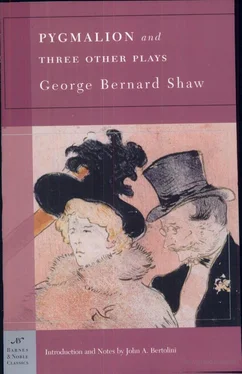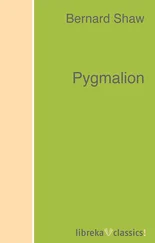THE FLOWER GIRL [ rising in desperation] You ought to be stuffed with nails, you ought. [ Flinging the basket at his feet] Take the whole blooming basket for sixpence.
The church clock strikes the second quarter.
HIGGINS [hearing in it the voice of God, rebuking him for his Pharisaic [192] Relating to the Pharisees, a sect often portrayed in the Bible as hypocritical.
want of charity to the poor girl] A reminder. [He raises his hat solemnly; then throws a handful of money into the basket and follows Pickering].
THE FLOWER GIRL [picking up a half-crown] Ah-ow-ooh! [ Picking up a couple offlorins] Aaah-ow-ooh! (Picking up several coins] Aaaaaah-ow-ooh! [Picking up a half-sovereign ] Aaaaaaaa,aa.aah-ow-ooh!!!
FREDDY [ springing out of a taxicab] Got one at last. Hallo! [To the girl ] Where are the two ladies that were here?
THE FLOWER GIRL They walked to the bus when the rain stopped.
FREDDY And left me with a cab on my hands. Damnation!
THE FLOWER GIRL [ with grandeur ] Never you mind, young man. I’m going home in a taxi. [ She sails off to the cab. The driver puts his hand behind him and holds the door firmly shut against her. Quite understanding his mistrust, she shews him her handful of money. Eightpence aint no object to me, Charlie. [He grins and opens the door]. Angel Court, Drury Lane, round the corner of Micklejohn’s oil shop. Lets see how fast you can make her hop it. [She gets in and pulls the door to with a slam as the taxicab starts ] .
FREDDY Well, I’m dashed!

Next day at 11 a.m. Higgins’s laboratory in Wimpole Street. It is a room on the first floor, looking on the street, and was meant for the drawing-room. The double doors are in the middle of the back wall; and persons entering find in the corner to their right two tall file cabinets at right angles to one another against the walls. In this corner stands a flat writing-table, on which are a phonograph, a laryngoscope, a row of tiny organ pipes with a bellows, a set of lamp chimneys for singing flames [193] Lamp chimneys are glass tubes around the wick of an oil lamp that keep the flame steady; flames in the tube that resonate to the human voice are called “singing flames.”
with burners attached to a gas plug in the wall by an indiarubber tube, several tuning-forks of different sizes, a life-size image of half a human head, showing in section the vocal organs, and a box containing a supply of wax cylinders [194] Used in the earliest phonographs as a medium for recording and replaying sound.
for the phonograph.
Further down the room, on the same side, is a fireplace, with a comfortable leather-covered easy-chair at the side of the hearth nearest the door, and a coal-scuttle. There is a clock on the mantelpiece. Between the fireplace and the phonograph table is a stand for newspapers.
On the other side of the central door, to the left of the visitor, is a cabinet of shallow drawers. On it is a telephone and the telephone directory. The corner beyond, and most of the side wall, is occupied by a grand piano, with the keyboard at the end furthest from the door, and a bench for the player extending the full length of the keyboard. On the piano is a dessert dish heaped with fruit and sweets, mostly chocolates.
The middle of the room is clear. Besides the easy-chair, the piano bench, and two chairs at the phonograph table, there is one stray chair. It stands near the fireplace. On the walls, engravings; mostly Piranesis {49} 49 5 (p. 381) On the walls, engravings; mostly Piranesis: Giovanni Battista Piranesi (1720-1778) was an Italian architect and engraver; his Carceri (Prisons) engravings depict enormous and labyrinthine structures that, as geometric displays, appeal to Higgins’s scientific taste.
and mezzotint portraits. [195] Portraits engraved on copper or steel; Higgins prefers their austerity to voluptuous color.
No paintings.
Pickering is seated at the table, putting down some cards and a tuning-fork which he has been using. Higgins is standing up near him, closing two or three file drawers which are hanging out. He appears in the morning light as a robust, vital, appetizing sort of man of forty or thereabouts, dressed in a professional-looking black frock-coat with a white linen collar and black silk tie. He is of the energetic, scientific type, heartily, even violently interested in everything that can be studied as a scientific subject, and careless about himself and other people, including their feelings. He is, in fact, but for his years and size, rather like a very impetuous baby “taking notice” eagerly and loudly, and requiring almost as much watching to keep him out of unintended mischief. His manner varies from genial bullying when he is in a good humor to stormy petulance when anything goes wrong; but he is so entirely frank and void of malice that he remains likeable even in his least reasonable moments.
HIGGINS [ as he shuts the last drawer] Well, I think thats the whole show.
PICKERING It’s really amazing. I havnt taken half of it in, you know.
HIGGINS Would you like to go over any of it again?
PICKERING [ rising and coming to thefireplace, where he plants himself with his back to the fire] No, thank you; not now. I’m quite done up for this morning.
HIGGINS [ following him, and standing beside him on his left] Tired of listening to sounds?
PICKERING Yes. It’s a fearful strain. I rather fancied myself because I can pronounce twenty-four distinct vowel sounds; but your hundred and thirty beat me. I cant hear a bit of difference between most of them.
HIGGINS [chuckling, and going over to the piano to eat sweets ] Oh, that comes with practice. You hear no difference at first; but you keep on listening, and presently you find theyre all as different as A from B. [Mrs. Pearce looks in: she is Higgins’s house keeper] Whats the matter?
MRS. PEARCE [ hesitatins, evidently perplexed ] A young woman wants to see you, sir.
HIGGINS A young woman! What does she want?
MRS. PEARCE Well, sir, she says youll be glad to see her when you know what shes come about. Shes quite a common girl, sir. Very common indeed. I should have sent her away, only I thought perhaps you wanted her to talk into your machines. I hope Ive not done wrong; but really you see such queer people sometimes — youll excuse me, I’m sure, sir —
HIGGINS Oh, thats all right, Mrs. Pearce. Has she an interesting accent?
MRS. PEARCE Oh, something dreadful, sir, really. I dont know how you can take an interest in it.
HIGGINS [to PICKERING] Lets have her up. Shew her up, Mrs. Pearce [he rushes across to his working table and picks out a cylinder to use on the phonograph).
MRS. PEARCE [only half resigned to it] Very well, sir. It’s for you to say. [She goes downstairs].
HIGGINS This is rather a bit of luck. I’ll shew you how I make records. We’ll set her talking; and I’ll take it down first in Bell’s visible Speech; then in broad Romic; [196] System of phonetic notation devised by English phonetician Henry Sweet (1845-1912).
and then we’ll get her on the phonograph so that you can turn her on as often as you like with the written transcript before you.
Читать дальше













